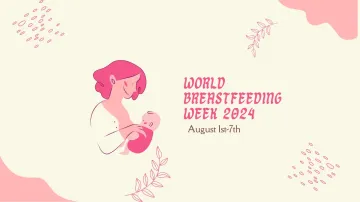World Breastfeeding Week is observed annually from August 1st to 7th to raise awareness about the importance of breastfeeding for both mother and child. Despite its numerous benefits, breastfeeding is often shrouded in misconceptions. To dispel these myths, we spoke to Dr. Apurva Gupta, consultant, obstetrics & gynaecology, Daffodils by Artemis, Delhi, to shed light on some common breastfeeding beliefs.
Myth: Breastfeeding is always painful
Many new mothers believe that breastfeeding will inevitably cause pain. While some discomfort is normal during the initial days as both mother and baby adjust, persistent pain is not normal. Experts emphasize that pain usually indicates an issue with the baby's latch or positioning. Consulting a lactation specialist can help in addressing and resolving these issues, ensuring a comfortable breastfeeding experience. Proper latch and positioning techniques are necessary to avoid pain and promote effective milk transfer.
Myth: You can't breastfeed if you have small breasts
The size of a woman's breasts does not determine her ability to produce enough milk for her baby. Breast size is largely determined by fatty tissue, while milk production is related to glandular tissue, which varies among individuals. Women with small breasts can produce just as much milk as those with larger breasts. Effective breastfeeding depends on the baby's regular feeding and the mother's ability to respond to their hunger cues, not breast size.
Myth: Formula is just as good as breast milk
While formula can provide necessary nutrients, it lacks the unique antibodies and living cells found in breast milk that help protect babies from infections and diseases. Breast milk also adapts to the baby's changing needs over time. Breast milk offers numerous health benefits, including reduced risks of respiratory infections, gastrointestinal issues, and certain chronic conditions like diabetes and obesity. Although formula feeding is a viable alternative when breastfeeding is not possible, breast milk remains the optimal choice for infant nutrition.
Myth: Breastfeeding moms should avoid certain foods
Many believe that breastfeeding mothers need to follow strict dietary restrictions to prevent upsetting their baby's stomach. While it's true that some babies may react to certain foods, most mothers can eat a varied diet without issues. Experts recommend a balanced diet rich in nutrients to support both the mother's and the baby's health. If a baby shows signs of sensitivity or allergy, it may be necessary to eliminate specific foods temporarily, but these cases are quite rare.
Myth: You should stop breastfeeding when you get sick
A common misconception is that mothers should stop breastfeeding if they are ill to avoid passing on the illness to their baby. In reality, continuing to breastfeed while sick is beneficial because breast milk contains antibodies that can help protect the baby from the same illness. Experts assure that most common illnesses, such as colds or flu, are not transmitted through breast milk. Instead, the mother's body produces antibodies that boost the baby's immune system, often resulting in the baby experiencing milder symptoms or avoiding the illness altogether.
It’s important to dispel these myths, for promoting a successful and rewarding breastfeeding journey.
ALSO READ: World Breastfeeding Week 2024: Five foods that can increase breast milk production
